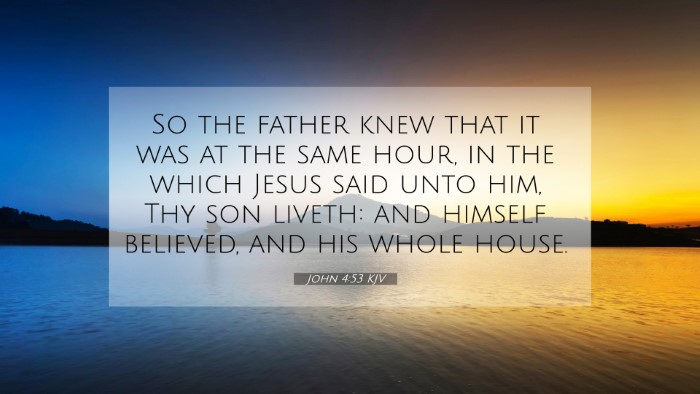Understanding John 4:53
John 4:53 states, "So the father knew that it was at that hour when Jesus said to him, 'Your son lives.' And he himself believed, and his whole household." This verse represents a profound moment of faith and healing, illustrating both the power of Jesus' words and the resultant transformation in the lives of those who believe.
Contextual Analysis
To fully grasp the meaning of this verse, we must consider its place within the narrative of John 4. This chapter recounts the story of Jesus' encounter with a Samaritan woman and a royal official whose son is gravely ill. The official comes to Jesus seeking help, and in response to his plea, Jesus instructs him to return home, stating that his son will live. The official trusts in Jesus’ word, which illustrates a deepening faith born from his experience.
Key Themes
- Faith and Belief: The verse highlights the transformation that occurs when one believes in Jesus. The official not only believes for himself but also influences his entire household.
- Miraculous Healing: This event is a demonstration of Jesus' authority over illness and death—signifying His divine nature.
- Personal Experience of Faith: The knowledge that he gained through the miraculous healing prompted the official's belief, illustrating that faith often grows from personal experience.
Insights from Commentaries
Various public domain commentaries provide rich insights into the meaning of this verse:
- Matthew Henry: He emphasizes the role of faith in the narrative, stating that the official’s faith was not merely intellectual but practical, as he acted on Jesus’ word.
- Albert Barnes: Barnes notes the significance of the timing of the healing, which reinforces the notion that Jesus’ authority transcends physical distance and circumstances.
- Adam Clarke: Clarke discusses the impact of the healing on the household, suggesting a ripple effect of faith resulting from the official’s experience with Jesus.
Bible Verse Cross-References
This verse relates to several other passages that echo its themes of faith, healing, and the transformative power of Christ. Below are notable cross-references:
- John 11:40: "Did I not say to you that if you would believe you would see the glory of God?" — This verse emphasizes the importance of faith in witnessing God’s works.
- Matthew 8:5-13: The faith of the centurion who believed Jesus could heal his servant from a distance parallels the official’s experience.
- Mark 5:34: "Daughter, your faith has made you well; go in peace, and be healed of your affliction." — Here, faith leads to healing.
- Luke 8:50: Jesus tells Jairus not to fear but to believe, reflecting the same call to faith in desperate circumstances.
- Acts 16:31: "Believe in the Lord Jesus, and you will be saved, you and your household." — Highlights the communal aspect of belief and its impact.
- John 3:36: "He who believes in the Son has everlasting life." — Reinforces the necessity of belief for salvation and eternal life.
- James 5:15: "And the prayer of faith will save the one who is sick, and the Lord will raise him up." — Links prayer and faith to healing, consistent with the themes in John 4:53.
Connecting Related Verses
The connections between these verses exemplify the themes of faith and healing across the Gospels:
- Miraculous Acts: The miracles of Jesus, such as the healing of the leper (Matthew 8:2-3) and the raising of Lazarus (John 11), showcase His authority and power.
- Faith and Salvation: The parallels in the response to Jesus—seen in both the royal official and others like the woman with the issue of blood—highlight the transformative aspect of faith.
Thematic Connections
Exploring the inter-Biblical dialogue around this verse provides further depth:
- Old Testament Promises: The themes of faith and healing echo the prophecies found in Isaiah (Isaiah 53:5) about the suffering servant, who would bear our infirmities.
- New Testament Assurance: The assurance of faith leading to salvation related to John 4:53 resonates throughout the epistles, particularly in the writings of Paul (Ephesians 2:8).
Conclusion
In summary, John 4:53 serves as a pivotal moment illustrating the power of Jesus, the importance of belief, and the transformative potential of faith. The cross-references and connections to other scriptures deepen our understanding and enhance our ability to link Bible verses meaningfully. As you study this verse, consider the broader implications of faith and healing found throughout the biblical narrative.












